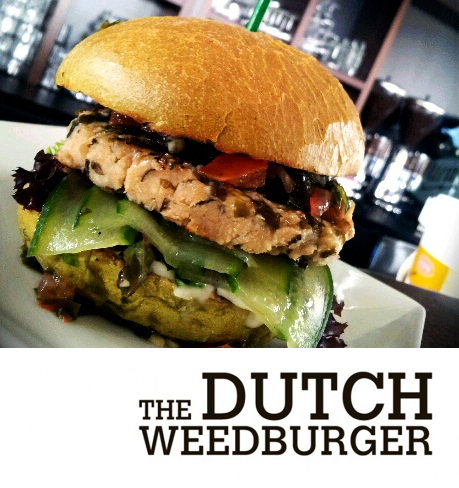The first time I got to know about this delicious Dutch Weed Burger was at the Sustainability Festival of a Dutch political party. I got it for free, which offered me the opportunity to try out this ‘new’ food made from seaweed. To me this food seemed to be a luxury as I had not seen it before. As I was impressed by this delicious burger I was looking for it at other places, but it was only available in some exclusive restaurants or at big festivals in the other parts of the Netherlands.
A few months later I organised a design contest which would last 24 hours and this burger was still in my mind. I wanted to let more people try out this sea weed product, so I looked for the food merchant online, but it appeared to be too expensive. The Dutch weed burger seemed really exclusive to me and I was not able to make it part of my daily life.
Nevertheless more than one year later it is actually available at one of my favourite cafés: it is possible to eat this burger as many times as I would like.
The Dutch Weed Burger seemed more exclusive in the beginning, but is it now becoming part of our daily life? Will this food from the sea be part of our daily life or will it just be a luxury? Will it become available at every street corner? Will seaweed be the new Dutch weed?
Seaweed as daily food
This Dutch Weed Burger only consists of vegetables as the website of the Dutch Weed Burger shows us. This burger is made of both snips of soya beans and Royal Kombu, which is a so called ‘winter seaweed’. This seaweed contains good proteins and omega fatty acids. Summer seaweed is used as lettuce from the sea. Because this seaweed is only a vegetable it would therefore be appropriate for many kinds of diets. It is suitable as vegetarian, vegan, halal, kosher food and can therefore be part of the daily life of many people.[1]
Qualities of seaweed food
Food Matters and Zeewierwijzer explain the qualities of seaweed as food in more detail. Seaweed is nutritionally really dense and contains many minerals as many of them are being offered in the ocean.[2] Moreover the effects of eating seaweed are: blood purification, high dose of minerals (calcium, sodium, iodine and iron), source of vitamins and fibres, neutralisation of acid effects of other diets, protection against environmental toxins, increase of bodily anti-oxidants, boosting of weight loss.[3]
Seaweed is thus a healthy food that can be part of a healthy diet. It seems to be a perfect food in our daily life.
Sea
In The Netherlands we are surrounded by the sea so that the growing of seaweed can take place at many places nearby. When the seaweed gets processed to become a food product in the Netherlands itself, the transportation costs and emission of CO2 can stay low. In the Netherlands there are a few islands in the ‘Waddenzee’ that are fully surrounded by the sea. Texel, for instance, could profit from growing and processing seaweed for both own use and export reasons. Seaweed is available to everyone without limits. One condition for this to happen would be that this seawater should be non-polluted. The seaweed soaks the water that they are growing in, therefore clean seawater is of vital importance for the growing of healthy seaweed.[3]
More food products
The Dutch Weed Burger initiative should only be the beginning. The reason for the founders to start this was to create more room for the future of seaweed and cooking with plants.[4]
There are different kinds of seaweed, that are appropriate for different kinds of uses. Some are suitable as an ingredient for salads, vegetables and soups; others are used for making sushi rolls, jam, ‘wraps’ etcetera.[3] Seaweed is also being used as tea or as supplements.2
Willingness
We have to get used to the taste of seaweed and it is therefore recommended to start with small portions. Many herbs and spices are added to create more flavour.[2]
Voedingscentrum, the Dutch organisation that gives advice on food, describes the research of Motivaction about the willingness of people to occasionally eat seaweed instead of meat. About 2 people out of 10 say that they would do so.[5] If it will become more available people will get used to it, might try it out and make it part of their daily life.
Availability
By searching for some places to eat this fancy Dutch Weed Burger there are many options right now. Especially in the Randstad and at festivals these burgers are available. In the Northern part of the Netherlands the revolution still needs to take place, unfortunately, as I am there really often.
Before seaweed will become available in our daily life it will take a few years, because it still has to be tested which ones are suitable and which ones not.[5]
Conclusion
Seaweed is not yet part of our daily life, but it has the potential to become so. It can be produced in the sea, which is close by and it contains many useful nutrients. Because of its vegetable substance it is appropriate for vegetarians, vegans, Muslims, Jews. Though it might take some years before the seaweed will be tested, produced and people are used to the taste of it.
[1] http://dutchweedburger.com/
[2] http://www.zeewierwijzer.nl/zeewier-voeding/het-eten.html
[3] http://www.foodmatters.tv/health-resources/seaweed-superfoods
[4] https://www.nudge.nl/projects/the-dutch-weed-burger/
[5] http://www.voedingscentrum.nl/nl/nieuws/zou-jij-vlees-vervangen-door-zeewier-.aspx
